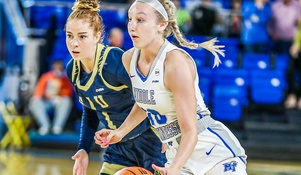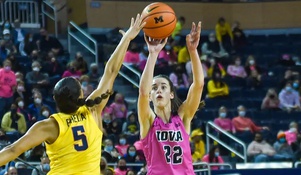Perception is Real: Candice Wiggins' Truth
On Monday, the San Diego Union-Tribune released a candid interview with recently retired WNBA player Candice Wiggins entitled 'Wiggins: WNBA's 'harmful' culture of bullying, jealousy'. From the moment the article was released social media was in an uproar about the claims Wiggins makes about her experiences during her eight-year career in the WNBA. From current players calling the article "just disappointing" or finding it "hard to believe", to former players flat out saying "It's both bullshit and it's EXTREMELY problematic." Many simply referred to it as #FakeNews.
In the article Wiggins proclaims that her entry into the WNBA, as many would assume, was not a dream come true and that in fact "it was quite the opposite." She describes the culture of the WNBA as "very very harmful" and claims that she was bullied throughout her career. Wiggins continued to take digs at the 20 year old league, calling it a “survival league” that she said still struggles for attention and legitimacy. “Nobody cares about the WNBA. Viewership is minimal. Ticket sales are very low. They give away tickets and people don’t come to the game.”
According to wnba.com, the WNBA’s historic 20th season "scored its highest attendance in five years and included record marks for WNBA digital, social media and retail."
Wiggins says that she experienced jealousy because of the way she looked and played and that players deliberately tried to "hurt her all of the time" because of this. “There were horrible things happening to me every day," she said. The extensive interview then took a turn for the worse when Wiggins equated her mistreatment to her sexuality.
“Me being heterosexual and straight, and being vocal in my identity as a straight woman was huge,” Wiggins said. “I would say 98 percent of the women in the WNBA are gay women. It was a conformist type of place. There was a whole different set of rules they (the other players) could apply.
Wiggins had enough of the toxic and jealous culture of the WNBA and thus decided to retire after eight seasons in the league. A storied professional career, riddled with numerous injuries, where she won a WNBA championship with the Minnesota Lynx in 2011, Wiggins has moved on to other career aspirations, one being an author where she plans on releasing an autobiography based on her journals as a player. Although this interview caused quite the stir, maybe, just maybe, these experiences were real.
Let's talk about the pink elephant in the room. Everyone knows the WNBA has a lot of players that identify as gay. 98%? It's fair to say that's a stretch, however, it's also fair say that during a span of eight years in the WNBA there were possibly more gay players than non-gay players. Does this matter in the grand scheme of things? No. But it does matter to someone that is not in the majority. Perception is real. We all live in our own realities by virtue of how we perceive and understand things and for Wiggins, this was her reality.
What if the tables were turned? How does the one or two gay people feel in a locker room full of heterosexuals? Perhaps this is why there are no "out" male professional athletes in the NBA or the NFL. If Wiggins perceived her maltreatment to stem from her femininity in a league that "encouraged women to look and act like men in the NBA," if she was bullied because she was "proud to be a woman," then these feelings are real and we cannot discount what she felt. This was her perception.
What does it feel like to be in the minority? Although the WNBA is one of the most deliberately accepting and engaging professional leagues in the world, Wiggins felt like a minority and thus alienated. This could be her own doing but again, this is how she felt. If Wiggins was reminded daily (People were deliberately trying to hurt me all of the time), that she was different, that can be discouraging and even embarrassing. "My spirit was being broken," Wiggins said and perhaps we need to make sure that no player ever has to go through what Wiggins went through. Yes there is competition, probably some jealousy too, but this is sports! It's a competition.
But before she gets a pass for bashing the very league that gave her the platform to even make her feelings relevant, before she makes statements that some would call false and stereotypical statements about a group of women who sacrifice year-round to uphold the values and legacy of the WNBA, Wiggins needs to check her privilege at the door, and not group her very unfortunate personal experiences on an entire group of women and in the next breath say but um "I’m not trying to crush anyone’s dreams or aspirations, or the dreams of the WNBA. I want things to be great..." If you want things to be great then start with accountability first and maybe ask yourself what did I do to make the atmosphere better for future players.
I can say in my eleven seasons in the WNBA I've never witnessed the kind of bullying Wiggins describes in her interview. This does not mean it did not happen but I'm proud to be apart of a league that supports inclusion and celebrates all players regardless of their race, religion or sexuality. We are a family made up of players that love and respect the game of basketball. We are dedicated to growing the game and our league through integrity, honesty and hardwork. I feel awful that Candice had these experiences while playing in the WNBA but I encourage her to not only speak out about the negative aspects of her career but also shed light on how we can prevent this from ever happening again. The WNBA gave you a platform to emerge as an advocate for HIV/AIDS in which you have a very personal connection. The WNBA supported you, worked with you, gave you a voice. Why now? Why bring down the league you say you want to be successful? Why not uplift, advocate, and encourage young women to be themselves as you were during your playing days. Let young girls know that it's ok to be "different", teach them how to overcome, how to survive and to come out on top. Your voice will be much more appreciated and received that way.
In a world where we are already so divided I think it is important for people to tell their stories and to share their experiences. It's equally important for people to listen and to care. I commend Candice Wiggins for telling her story and I look forward to seeing how she uses her experiences to to ensure this never ever happens to anyone again.
---Monique Currie


